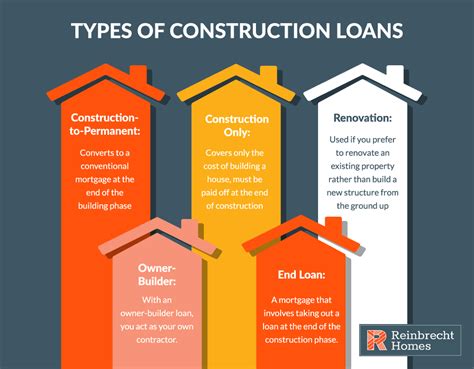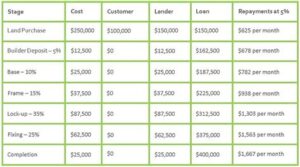
In the ever-evolving world of construction financing, understanding the intricacies of loan options is crucial for both builders and buyers. Exploring The Benefits Of Fixed Construction Loan Rates delves into this essential topic, shedding light on the significance of fixed rates in ensuring financial stability and predictability for your projects.
As construction costs fluctuate and markets shift, locking in a fixed rate can provide peace of mind and a clearer roadmap for budgeting. This article will not only demystify fixed construction loan rates but also compare them with variable rates, highlighting key advantages to help you make informed financial decisions.
Embark on this journey to discover how fixed loan rates can enhance your construction experience, paving the way for successful project completion without unforeseen financial burdens.
Understanding Fixed Construction Loan Rates And Their Importance
Fixed construction loan rates play a crucial role for borrowers embarking on new construction projects. With a fixed rate, the interest costs remain constant throughout the loan’s life, ensuring a predictable financial environment. This stability can be particularly beneficial in the face of fluctuating market conditions, where variable rates may increase unexpectedly.
One of the most significant advantages of fixed rates is how they help in budgeting and financial planning. By knowing exactly how much will be paid each month, borrowers can better manage their finances without the worry of increasing payment amounts that are often associated with variable loans. This aspect is particularly important for projects with tight margins, where every dollar counts.
Additionally, fixed construction loan rates can reduce the overall cost of borrowing over time. By locking in a lower rate at the outset, borrowers can avoid potential spikes in interest rates that may occur during the project duration. This financial predictability not only eases stress but can also allow for better allocation of resources through the duration of the construction process.
Understanding the significance of fixed construction loan rates can greatly enhance a borrower’s ability to manage their construction finances effectively. As you are exploring the benefits of these loans, it becomes essential to appreciate their role in providing financial security and reducing uncertainty in project management.
How Fixed Rates Provide Financial Stability For Projects
When embarking on a construction project, financial uncertainty can lead to unnecessary stress and complications. By exploring the landscape of fixed construction loan rates, borrowers can secure a sense of stability that is vital for successful project execution. Fixed rates allow project managers and stakeholders to know precisely what the repayment amount will be throughout the life of the loan, eliminating fluctuations that come with variable rates.
This certainty not only aids in financial planning but also facilitates smoother project management. With fixed rates, contractors can create more accurate budgets, ensuring that funds allocated for labor, materials, and other expenses are correctly aligned with the loan repayment schedule. Understanding these parameters is crucial when aiming for an efficient construction process.
Moreover, fixed rates often attract favorable terms, including but not limited to lower interest rates compared to variable counterparts. This can result in significant cost savings over time, ultimately boosting the project’s bottom line. By locking in a fixed interest rate, borrowers can protect themselves against potential market rate hikes during construction, ensuring their financial strategy remains sound.
Opting for fixed construction loan rates can enhance financial stability, promoting confidence in the funding process. This stability is essential for timely project completion and can greatly improve the overall experience for all parties involved.

Benefits Of Exploring The Predictability In Repayment Plans
One of the most significant advantages of exploring the predictability in repayment plans associated with fixed construction loan rates is the peace of mind it offers borrowers. When embarking on a construction project, maintaining a clear understanding of financial obligations is crucial for effective budgeting and resource allocation.
With fixed rates, borrowers can easily forecast their monthly payments, making it simpler to plan for other expenses related to the construction process. This stability allows homeowners and contractors alike to allocate their finances more efficiently, ensuring that there are sufficient funds available for labor, materials, and unexpected costs that may arise during construction.
Furthermore, the predictability in repayment plans can aid in long-term financial planning. Knowing the exact amount due each month can help individuals avoid unexpected financial strain and better manage their cash flow. This aspect is particularly beneficial during the construction phase when expenditures can be unpredictable.
Additionally, fixed loan rates shield borrowers from interest rate fluctuations in the market. In a volatile economic environment, having a stable repayment plan means that even if market rates rise, the borrower’s payment structure remains unchanged, preventing any potential financial pitfalls.
An understanding of repayment predictability enhances the overall experience of the borrowing process. Borrowers can focus on their projects rather than worrying about fluctuating costs, contracts, or potential financial overreach. This clarity fosters a more positive outlook on the project’s progress and success.
Comparing Fixed Loan Rates With Variable Rates: What You Need To Know
When considering financing options for your construction project, understanding the differences between fixed loan rates and variable rates is crucial. Both options have their own unique benefits and potential drawbacks that may impact your project’s financial outcome. Here’s an in-depth look at these two types of rates:
Fixed construction loan rates offer a stable interest rate throughout the term of the loan, which makes budgeting and financial planning more straightforward. This consistency can be particularly valuable in times of economic uncertainty, where sudden interest rate hikes might occur. With fixed rates, you know exactly how much you will pay each month, allowing for better cash flow management.
On the other hand, variable rates can fluctuate based on the market index, which means that your monthly payments may increase or decrease over time. This could be beneficial if interest rates decrease during the loan term, potentially lowering your overall costs. However, there is always a risk that rates could rise, leading to higher payments than originally planned.
Key Differences to Consider:
- Stability vs. Flexibility: Fixed rates provide stability and predictability, while variable rates offer potential cost savings if rates drop.
- Payment Structure: Fixed loans ensure steady payments; variable loans may lead to varying payments depending on market conditions.
- Long-term Planning: Fixed rates are typically preferable for long-term projects due to their predictability.
- Interest Rate Environment: If market rates are low, a variable rate might seem attractive, but consider the risk of potential increases.
The choice between fixed and variable rates will depend on your individual financial situation, risk tolerance, and project timeline. When exploring the most suitable loan option, carefully weigh these factors to make an informed decision that best suits your construction project goals.

Maximizing Your Budget With Fixed Construction Loan Rates Advantages
When it comes to financing a construction project, leveraging the advantages of fixed construction loan rates can significantly impact your overall budget. One of the main benefits is exploring the certainty that fixed rates offer throughout the life of your loan. This predictability allows you to plan more effectively, as you will have a clear understanding of your monthly payments without the risk of fluctuations that often accompany variable rates.
Fixed rates help in creating a stable financial environment, which can lead to better budget management. With the peace of mind that comes from knowing your interest rate will not change, you can allocate more funds towards other essential aspects of your construction project, such as materials, labor, and unexpected costs that may arise.
Another essential aspect is the ability to maximize your financial resources. Since fixed rates often provide lower interest charges compared to their variable counterparts, the lower overall cost translates into better financial flexibility. This could mean being able to afford upgrades or additional features in your building project that would otherwise be out of reach.
By exploring the advantages of fixed construction loan rates, you are not just securing a stable financial path, but you are also maximizing your budget efficiency, enabling you to achieve your construction goals more effectively.

Frequently Asked Questions
What is a fixed construction loan rate?
A fixed construction loan rate is an interest rate that remains constant throughout the loan term. This means that the borrower will not be subject to fluctuations in interest rates during the life of the loan, providing stability in monthly payments.
What are the main benefits of choosing a fixed construction loan rate?
The main benefits include predictable monthly payments, protection against rising interest rates, easier budgeting, and potential savings over the loan’s term compared to variable rates.
Who should consider a fixed construction loan?
Homeowners planning a new construction project, builders looking for financial certainty, and anyone seeking financial stability should consider a fixed construction loan.
How do fixed construction loan rates compare to variable rates?
Fixed rates provide stability and predictability, while variable rates can offer lower initial payments but may increase over time, leading to uncertainty in the total cost of the loan.
Are there any drawbacks to fixed construction loan rates?
One potential drawback is that fixed rates might be higher than the initial rates of variable loans. Additionally, if interest rates decrease, borrowers with fixed loans will not benefit from lower rates unless they refinance.
What factors influence fixed construction loan rates?
Factors include the overall economic climate, the borrower’s credit score, the loan amount, and the project type. Lenders may also consider the duration of the loan and associated risks.
How can borrowers secure the best fixed construction loan rates?
Borrowers can secure the best rates by improving their credit scores, shopping around for quotes from multiple lenders, and considering loan terms that match their financial goals.

Leave a Reply